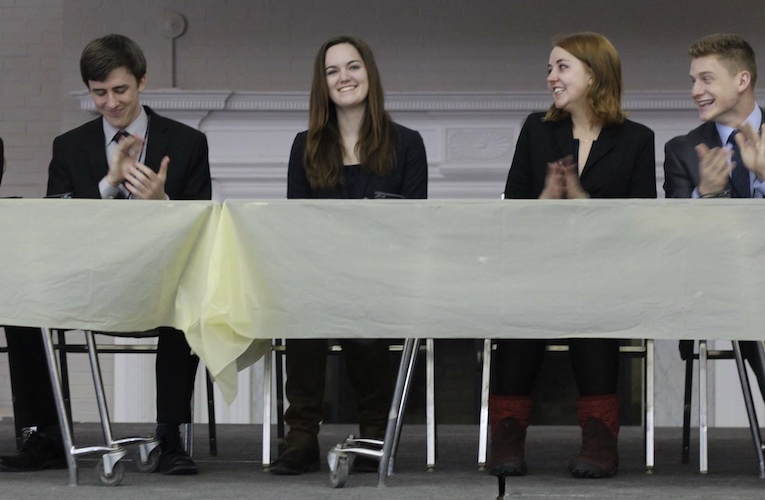Preventing Tragedy
FBI analyst Taylor Renard Cilke ’15 is part of an effort to stop mass violence
June 6, 2025
By
Thornton Ray ’13
In the wake of a high-profile shooting in the United States, headlines focus on what, where and who. But for Taylor Renard Cilke ’15, the most critical question is always why — and, more importantly, how can we stop this from happening again?
As an analyst in the FBI’s Behavioral Analysis Unit (BAU), Cilke (pronounced like "silky") is at the forefront of preventing mass violence, turning research into action and ensuring that communities have the tools to recognize and respond to warning signs before they escalate into catastrophe. Her journey from the classrooms of William & Mary to the highest levels of national security analysis is a testament to the power of curiosity, mentorship and a relentless commitment to making the world safer.
Cilke’s role with the FBI is the realization of a long-held dream. The Behavioral Analysis Unit, made famous by popular shows like “Criminal Minds,” operates within the FBI’s Critical Incident Response Group as part of the National Center for the Analysis of Violent Crime. Established in 1984, the BAU initially focused on serial and violent crimes but has since evolved into two specialized units: one dedicated to criminal investigations and another focused on preventing mass violence and homegrown terrorism. Cilke works within the latter, analyzing the motivations behind mass attacks and determining what interventions might have prevented them.
Her work has placed her at the center of some of the most devastating events in recent history. She has briefed senior FBI leadership after tragedies such as the 2016 Pulse nightclub shooting in Orlando, Florida, the 2019 attack at Naval Air Station Pensacola in Florida and the 2022 school shooting in Uvalde, Texas. In the aftermath of Uvalde, she spent 17 months conducting a comprehensive analysis to answer the critical question “What can we do better?” Her conclusion was clear: Prevention is possible, but it requires widespread public awareness and action.
“Tragedies are preventable,” Cilke says. “We know the warning signs, but the public doesn’t.”
Rigorous research over 30 years has identified behaviors that indicate an individual may be moving toward violence. While no single behavior guarantees an attack, patterns emerge. These include increased isolation, a fascination with previous attackers, testing security measures and an inappropriate or sudden interest in weapons. The earlier these warning signs are recognized, the greater the opportunity for intervention and assistance.
“The key is community,” Cilke emphasizes. “When people act on their concerns, they can change the trajectory of someone’s life — and potentially prevent a tragedy.”
Determined to bring this message to a wider audience, Cilke has become an advocate for mass violence prevention. She has spoken to major newspapers, increasing public awareness of pre-attack behaviors. She also delivered a keynote address at the national conference of the Association of Threat Assessment Professionals with an audience of over 1,100 people, sharing her insights and stressing the importance of community intervention. And she has created the FBI’s website to prevent mass violence. Throughout all these, her message is simple but urgent: Prevention starts with everyday people paying attention and taking action.
Cilke’s impact is far-reaching, but her path to the BAU began in the close-knit academic community of William & Mary as a government major. A pivotal figure in her journey was Kathryn “Kay” Floyd ’05, director of William & Mary’ s Whole of Government Center of Excellence, who not only encouraged Taylor to apply for a yearlong FBI internship, but also supported her through the stresses of college life.
“Professor Floyd was there for me at some of my lowest moments,” Cilke recalls. “Her encouragement made all the difference.”

Beyond the classroom, Cilke found inspiration and challenge in William & Mary’s International Relations Club. The club provided both intellectual rigor and camaraderie, offering her the chance to sharpen her public speaking skills, debate pressing global issues and engage with peers who were equally passionate about understanding and addressing complex problems. These experiences honed the skills she would later use in high-stakes briefings at the FBI.
After serving as a tactical specialist in the FBI, the opportunity arose to join the Behavioral Analysis Unit. Cilke seized it with the same enthusiasm that had defined her time at William & Mary.
“I was aggressively nerdy in my interview,” she says with a laugh, recalling how passionate she was discussing the nuances of how Americans radicalize. That passion paid off, securing her a position in a field that combines her analytical strengths with her desire to make a tangible difference.
As Cilke continues her work, she hopes to see a cultural shift in how the public perceives mass violence prevention. She wants to dispel the notion that attacks are random and unavoidable.
“People think these tragedies just happen out of nowhere, but they don’t,” she explains. “There are always signs. The challenge is making sure people know what to look for — and what to do when they see them.”
Thornton Ray ’13 is an Army veteran and management consultant. He participated in ROTC, Intervarsity and the sWiM Club at William & Mary, and professors Katherine Guthrie, Julie Richardson Agnew ’91 and Inga Carboni were great mentors during his undergraduate years. He is active in the Association of 1775, the W&M Alumni Association’s network for military/veteran and federal government alumni.